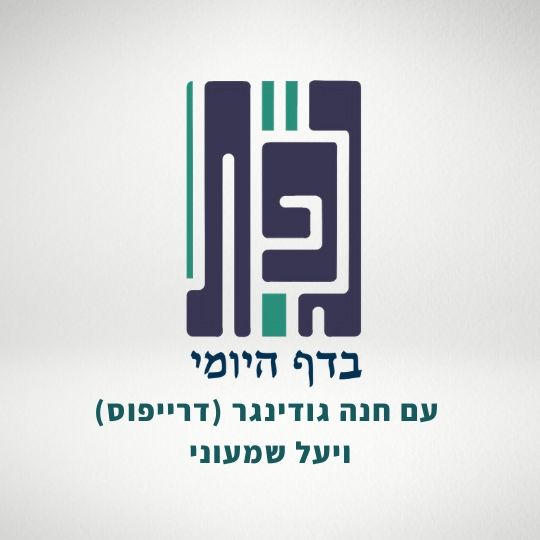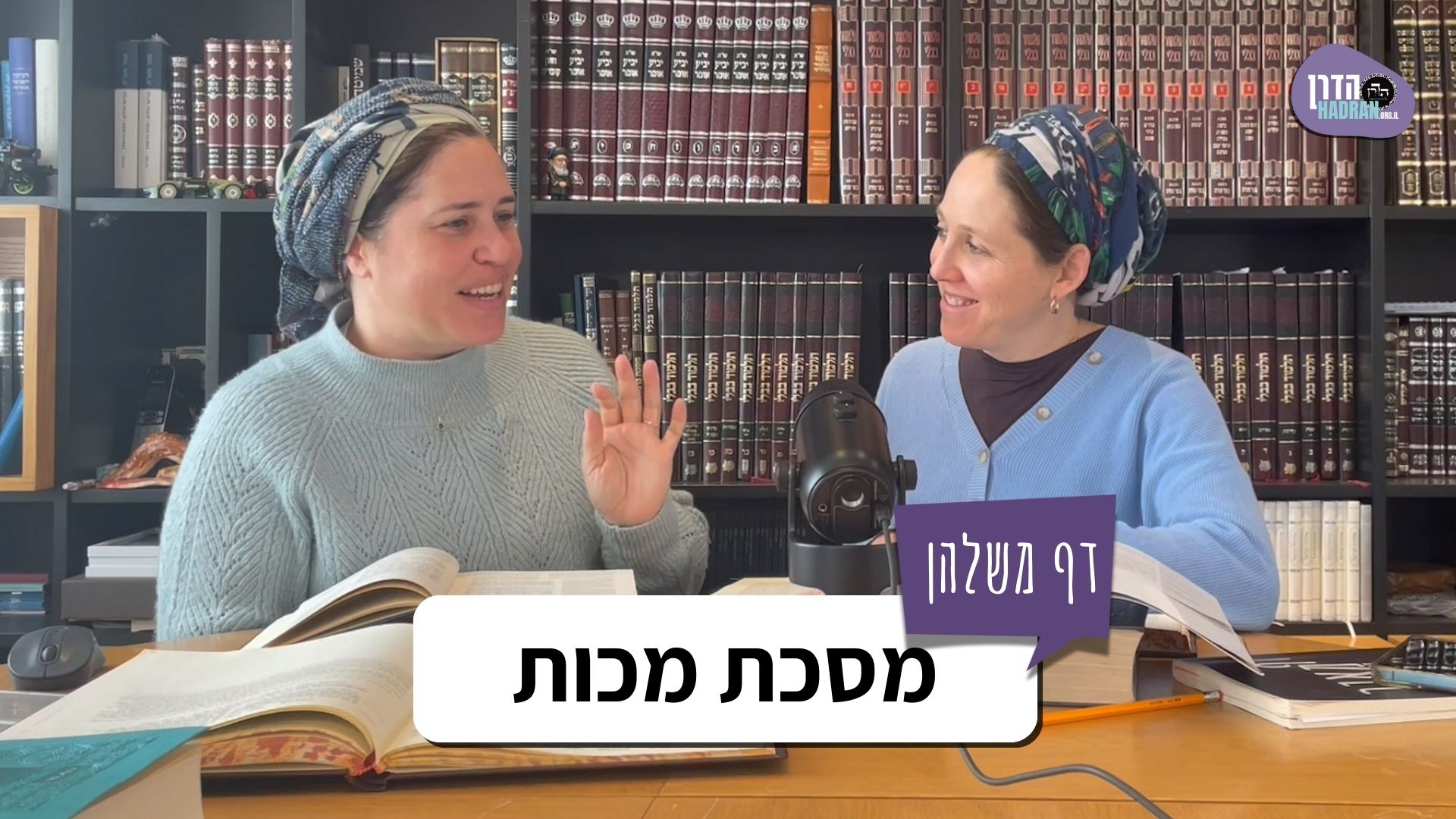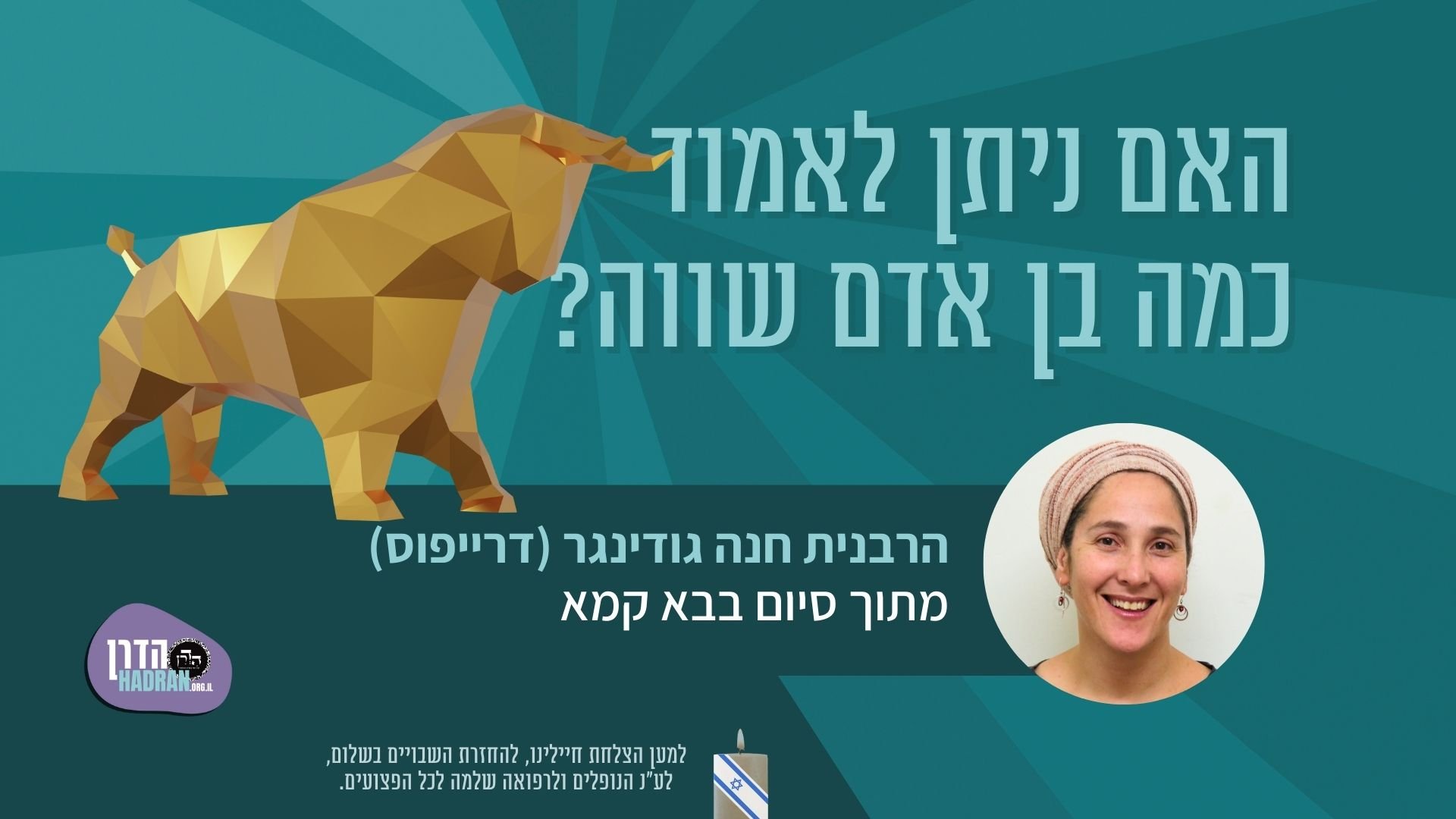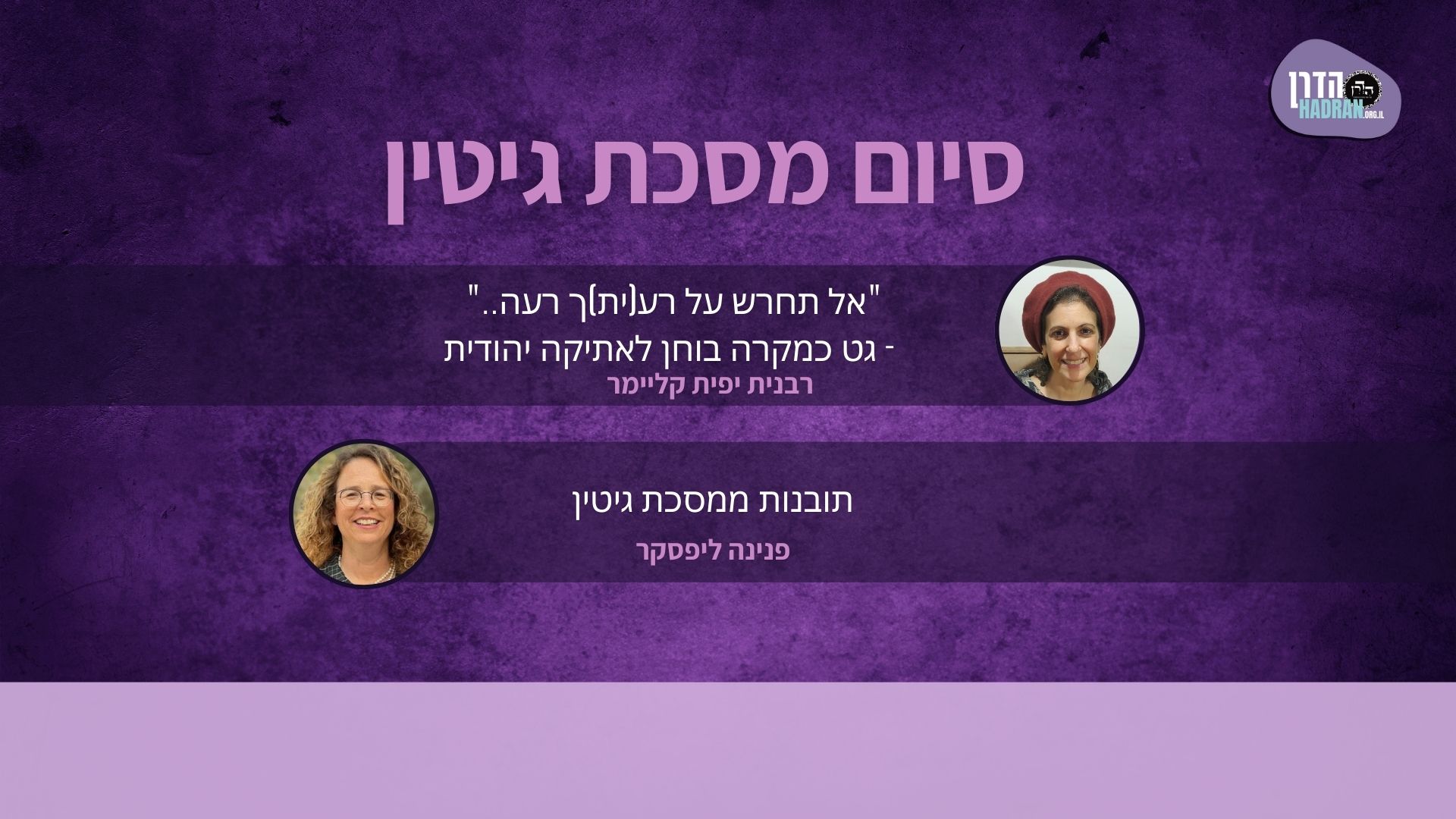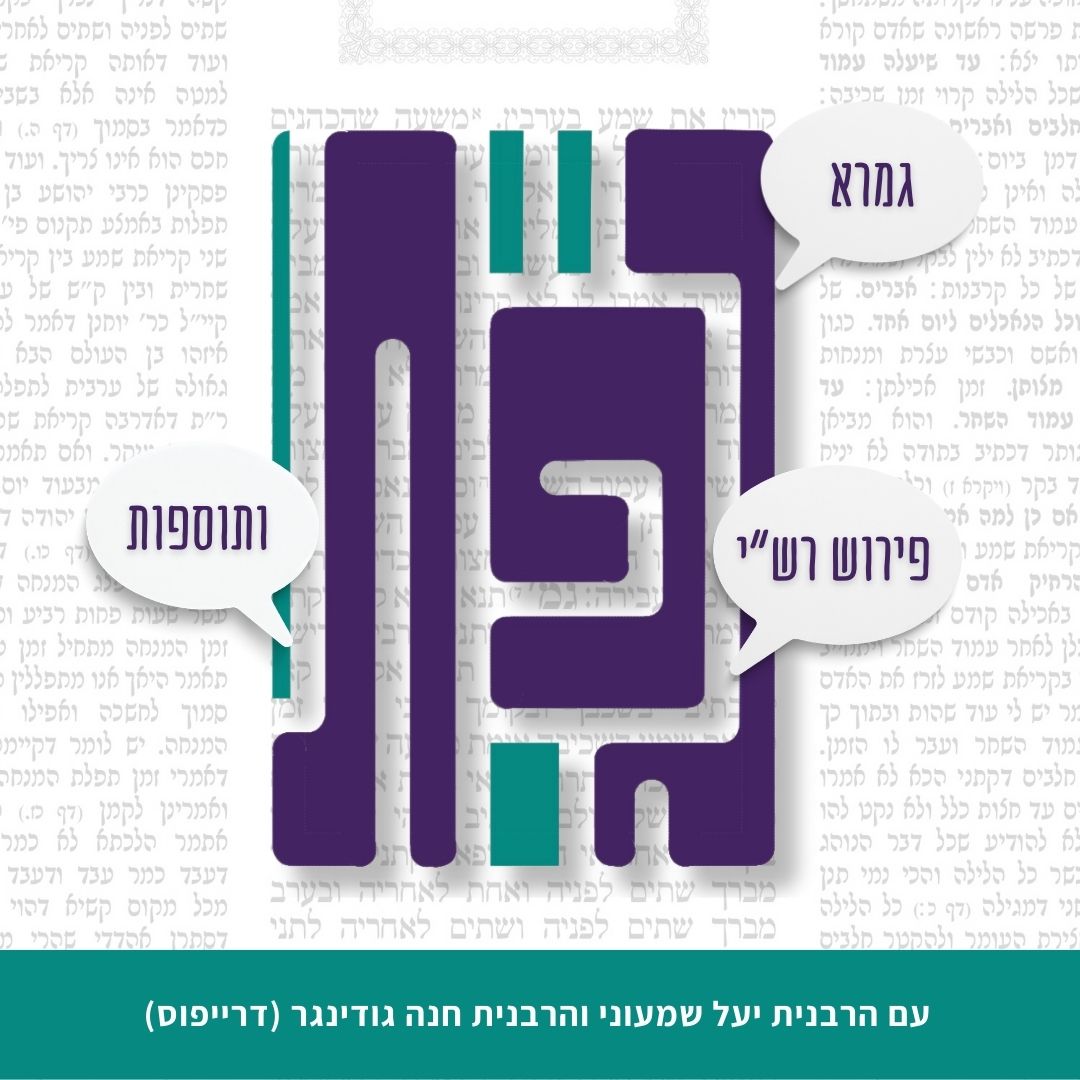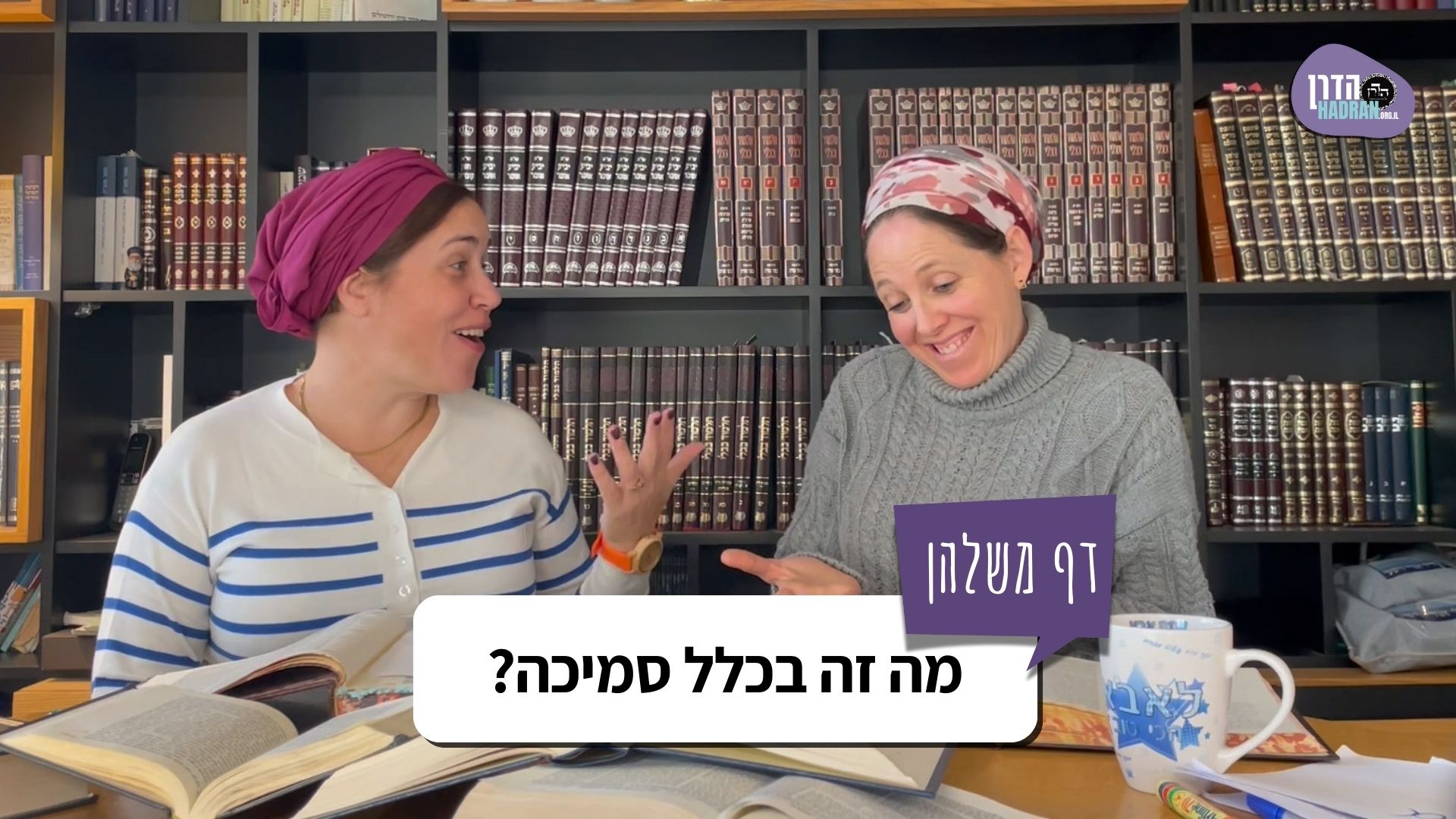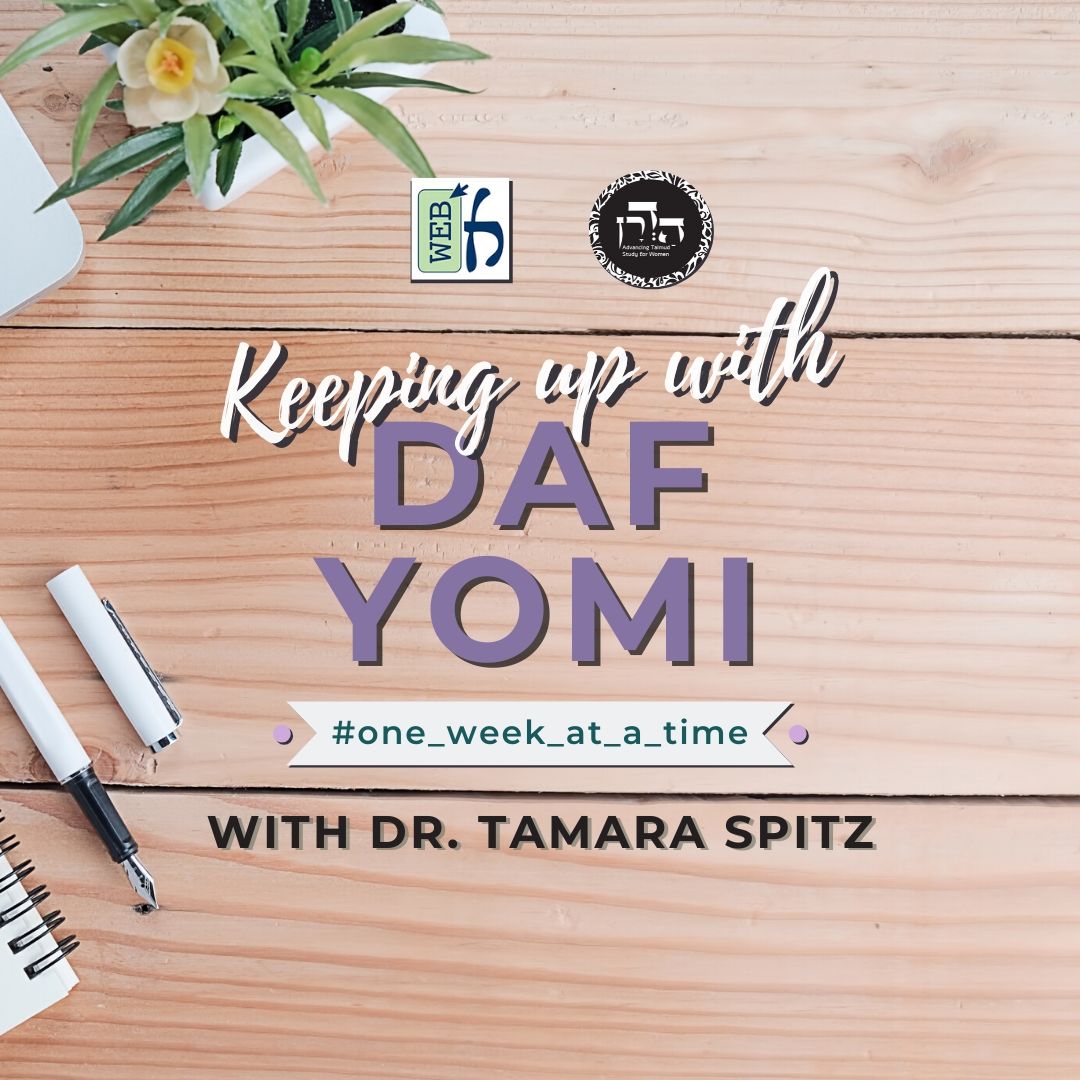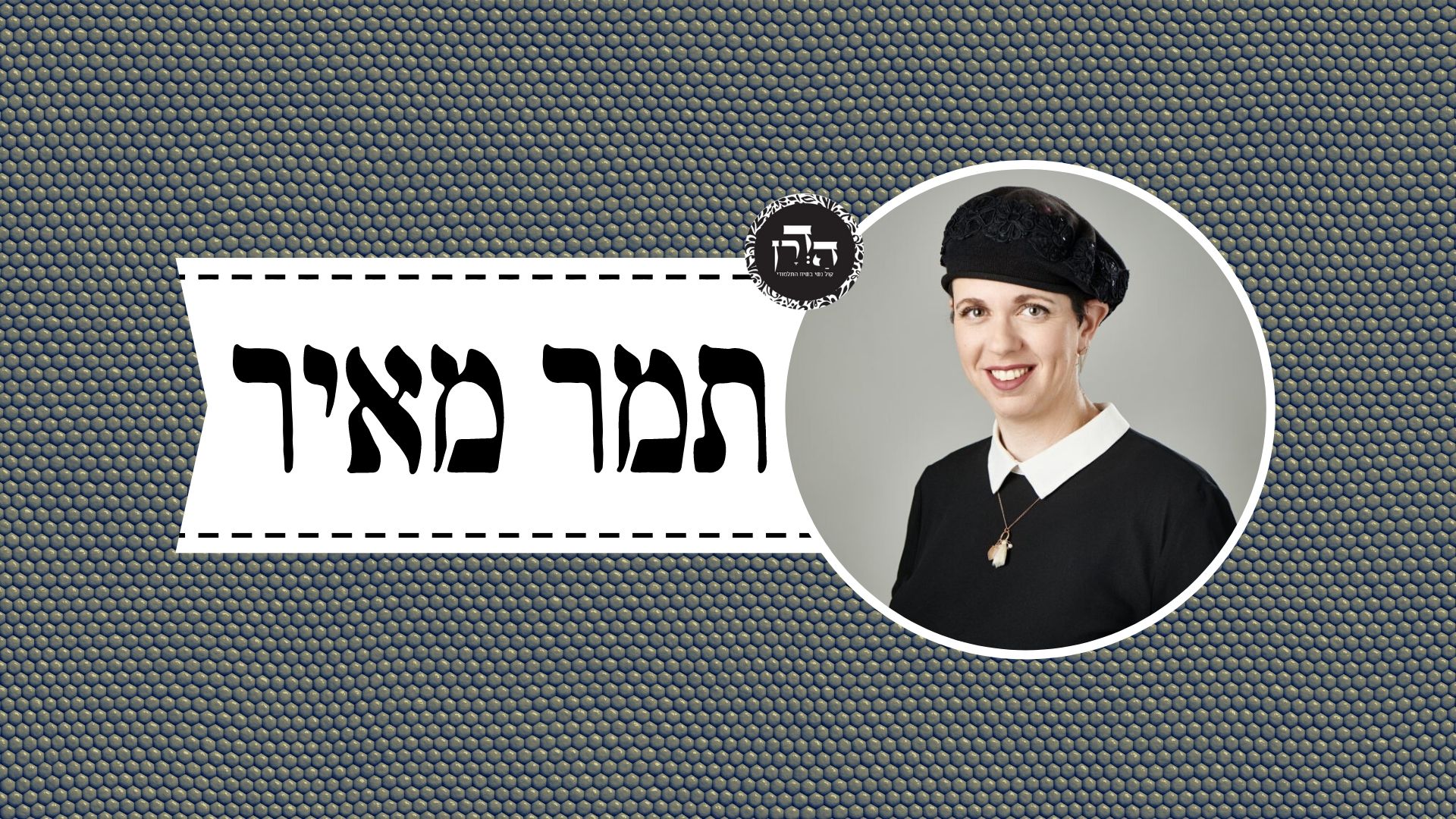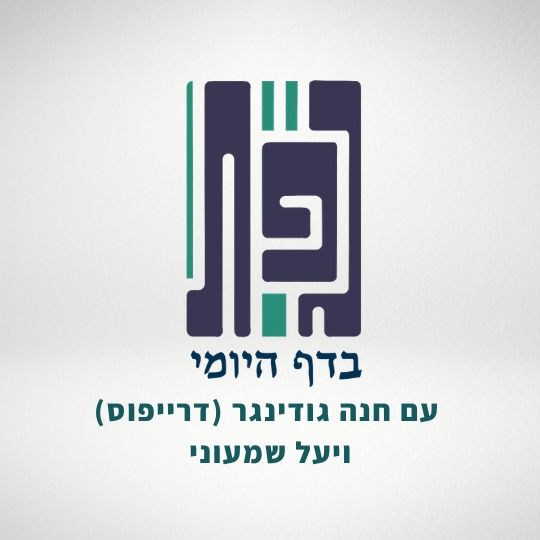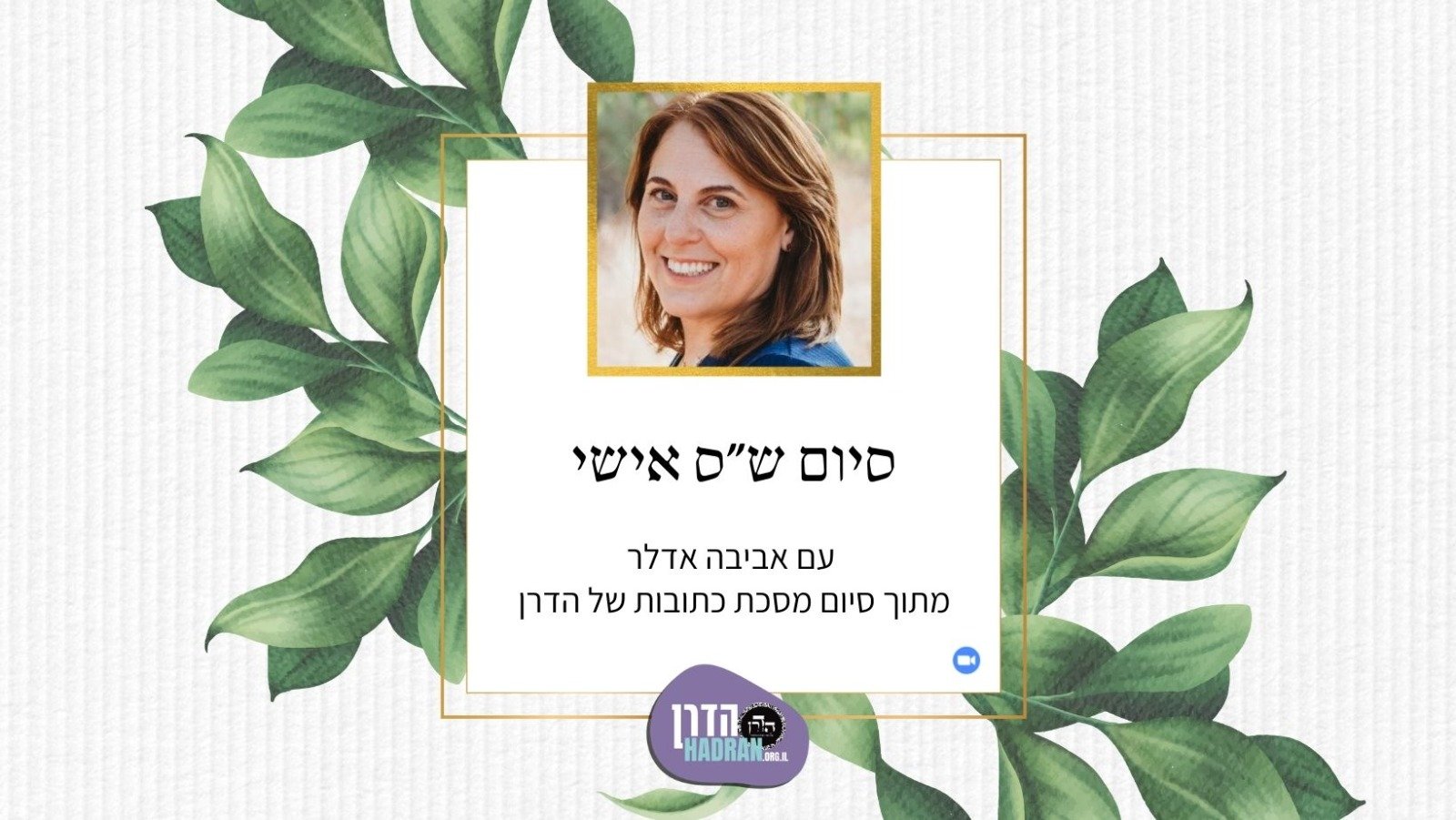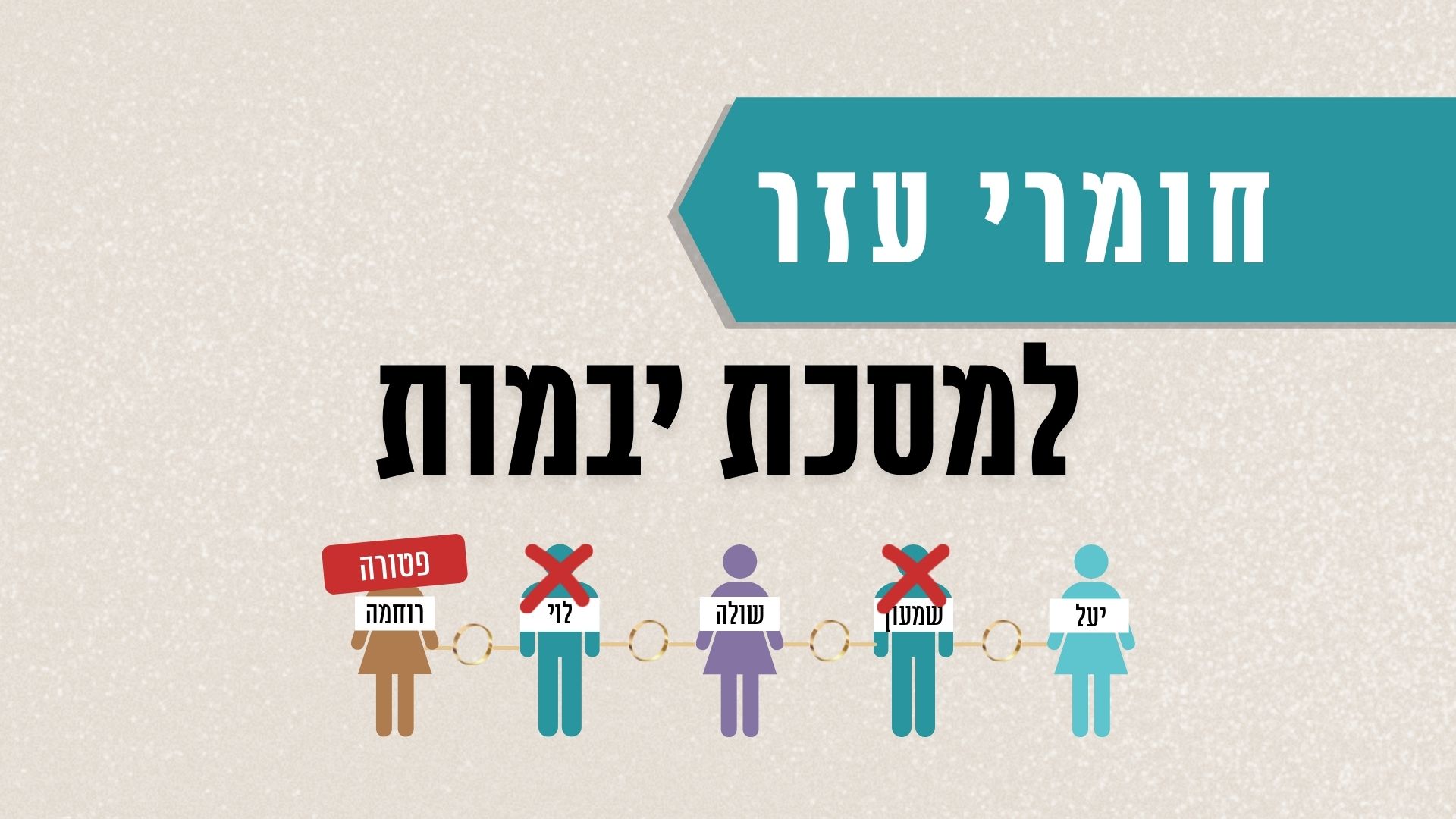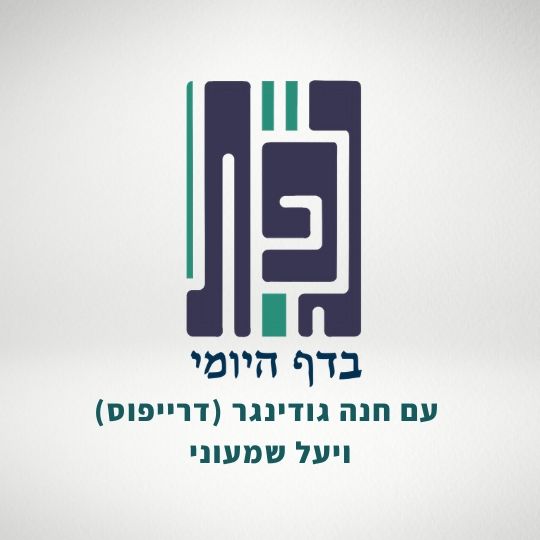במקרים שיש סכום קצוב בתורה – יש בו יכולת להיות יותר קל או יותר חמור – תלוי במקרה.

כלים
הלימוד החודש מוקדש לרפואת פיליס הכט, גיטל פעשא בת מאשה רחל על ידי חברותיה הרבות שאוהבות ומעריכות אותה.
כלים
העמקה
רוצה להבין מה באמת קורה מתחת לפני השטח של הסוגיה?
שיעורים, פודקאסטים והרחבות של מיטב המורות שלנו יפתחו לך עוד זוויות וכיווני חשיבה.
חדשה בלימוד הגמרא?
זה הדף הראשון שלך? איזו התרגשות עצומה! יש לנו בדיוק את התכנים והכלים שיעזרו לך לעשות את הצעדים הראשונים ללמידה בקצב וברמה שלך, כך תוכלי להרגיש בנוח גם בתוך הסוגיות המורכבות ומאתגרות.
פסיפס הלומדות שלנו
גלי את קהילת הלומדות שלנו, מגוון נשים, רקעים וסיפורים. כולן חלק מתנועה ומסע מרגש ועוצמתי.
ערכין יד
מִלְּתָא אַגַּב אוֹרְחֵיהּ קָמַשְׁמַע לַן, כִּדְרַב יְהוּדָה אָמַר רַב, דְּאָמַר רַב יְהוּדָה אָמַר רַב: אָסוּר לָאָדָם שֶׁיֹּאמַר ״כַּמָּה נָאֶה גּוֹי זֶה״.
by not mentioning gentiles, the mishna teaches us another matter in passing, in accordance with the statement that Rav Yehuda says that Rav says. As Rav Yehuda says that Rav says: It is prohibited for a person to say: How beautiful is this gentile.
וְלִיתְנֵי ״אֶת הַנָּאֶה שֶׁבְּיִשְׂרָאֵל וְאֶת הַכָּעוּר שֶׁבַּגּוֹיִם״! בְּחַד אוּמָּה קָמַיְירֵי, בִּתְרֵי אוּמֵּי לָא מַיְירֵי.
The Gemara asks: But if this is the only reason that a gentile is not mentioned, let the mishna teach: In the case of one who took a vow of valuation to donate the fixed value of the most attractive among the Jewish people and the most unsightly among the gentiles, he gives the fixed payment of fifty sela to the Temple treasury. The Gemara answers: The tanna prefers to deal with one nation, i.e., Jews, and does not wish to deal with two nations, Jews and gentiles.
וְלָא? וְהָא קָתָנֵי: הַגְּדוֹלָה שֶׁבַּכְּהוּנָּה וְאֶת הַקְּטַנָּה שֶׁבְּיִשְׂרָאֵל! הָתָם חַד אוּמָּה הוּא, אֶלָּא מִקְדָּישׁ הוּא דְּקַדִּישִׁי כֹּהֲנִים טְפֵי.
The Gemara challenges this answer: And does the mishna not deal with two nations? But isn’t it taught in a mishna (14b): One who raped or seduced a young woman, whether she is the most prominent in the priesthood or the lowliest among the Israelites, gives the payment of fifty sela, the fine stated in the Torah. Priests and Israelites are two distinct groups of people, analogous to Jews and gentiles. The Gemara answers: In that mishna there it is one nation, as although there are two groups they are both part of the Jewish people. It is only that the priests have greater sanctity than Israelites.
וְאִיבָּעֵית אֵימָא, אַיְּידֵי דְּקָא בָּעֵי לְמִתְנֵי סֵיפָא ״שְׂדֵה אֲחוּזָּה״, דִּבְיִשְׂרָאֵל הוּא דְּמַשְׁכַּחַתְּ לַהּ, בְּגוֹי לָא מַשְׁכַּחַתְּ לַהּ, דְּלָאו בְּנֵי אֲחוּזָּה נִינְהוּ, מִשּׁוּם הָכִי קָתָנֵי לַהּ בְּיִשְׂרָאֵל.
And if you wish, say instead that since the mishna wants to teach the case of an ancestral field in the latter clause, which you find in the case of Jews, but you do not find with regard to gentiles, as they are unfit to have ancestral land in Eretz Yisrael, it is due to this reason that the mishna teaches only cases that involve the Jewish people.
מַתְנִי׳ בִּשְׂדֵה אֲחוּזָּה לְהָקֵל וּלְהַחֲמִיר, כֵּיצַד? אֶחָד הַמַּקְדִּישׁ בְּחוֹלַת הַמָּחוֹז, וְאֶחָד הַמַּקְדִּישׁ בַּפַּרְדֵּיסוֹת סְבַסְטֵי, נוֹתֵן זֶרַע חוֹמֶר שְׂעוֹרִים בַּחֲמִשִּׁים שֶׁקֶל כָּסֶף, וּבִשְׂדֵה מִקְנָה נוֹתֵן אֶת שׇׁוְויוֹ.
MISHNA: There are halakhot with regard to an ancestral field that are lenient and others that are stringent. How so? Both one who consecrates an ancestral field in the low-quality sands of the areas surrounding the city and one who consecrates the high-quality orchards of Sebastia gives a redemption payment of fifty silver shekels for every area that he consecrated that is fit for sowing a kor of barley (Leviticus 27:16). And with regard to a purchased field that one consecrates, he gives its value as redemption, a sum that can be more or less than fifty shekels for every area required for sowing one kor of barley.
רַבִּי אֱלִיעֶזֶר אוֹמֵר: אֶחָד שְׂדֵה מִקְנָה וְאֶחָד שְׂדֵה אֲחוּזָּה, מָה בֵּין שְׂדֵה אֲחוּזָּה לִשְׂדֵה מִקְנָה? שֶׁבִּשְׂדֵה אֲחוּזָּה הוּא נוֹתֵן חוֹמֶשׁ, וּבִשְׂדֵה מִקְנָה אֵינוֹ נוֹתֵן חוֹמֶשׁ.
Rabbi Eliezer says: With regard to both a purchased field and an ancestral field, one gives a redemption payment of fifty silver shekels for every area required for sowing a kor of barley that he consecrated. What, then, is the difference between an ancestral field and a purchased field? The difference is that in the case of an ancestral field one gives an additional payment of one-fifth, but in the case of a purchased field one does not give an additional payment of one-fifth.
גְּמָ׳ אָמַר רַב הוּנָא: הִקְדִּישׁ שָׂדֶה מְלֵיאָה אִילָנוֹת, כְּשֶׁהוּא פּוֹדָן — פּוֹדֶה אִילָנוֹת בְּשׇׁוְויָן, וְחוֹזֵר וּפוֹדֶה קַרְקַע בֵּית זֶרַע חוֹמֶר שְׂעוֹרִים בַּחֲמִשִּׁים שֶׁקֶל כָּסֶף. אַלְמָא קָסָבַר רַב הוּנָא: אָדָם מַקְדִּישׁ — בְּעַיִן יָפָה מַקְדִּישׁ.
GEMARA: Rav Huna says: In a case where one consecrated a field full of trees, when he redeems the trees and field, he redeems the trees according to their value, and then redeems the land according to the fixed formula, by which an area required for the sowing of a kor of barley seed is redeemed for fifty silver shekels. The Gemara notes that evidently Rav Huna holds that when a person consecrates, he consecrates generously. In this case he consecrated the trees and the land separately, so that he would have to redeem them each separately, rather than the trees being redeemed as part of the land.
אֵיתִיבֵיהּ רַב נַחְמָן לְרַב הוּנָא: אֶחָד הַמַּקְדִּישׁ בְּחוֹלַת הַמָּחוֹז, וְאֶחָד הַמַּקְדִּישׁ בְּפַרְדֵּיסוֹת סְבַסְטֵי, נוֹתֵן בֵּית זֶרַע חוֹמֶר שְׂעוֹרִים בַּחֲמִשִּׁים שֶׁקֶל כָּסֶף! אֲמַר לֵיהּ: רְאוּיָה לְפַרְדֵּיסוֹת קָאָמֵינָא.
Rav Naḥman raised an objection to Rav Huna from the mishna: Both one who consecrates an ancestral field in the low-quality sands of the areas surrounding the city and one who consecrates the high-quality orchards of Sebastia gives a redemption payment of fifty silver shekels for every area required for sowing a kor of barley that he consecrated. This indicates that when one consecrates orchards he does not redeem the land and the trees separately. Rav Huna said to Rav Naḥman: The mishna is speaking of land that is suitable for orchards but does not actually have trees planted on it.
אֵיתִיבֵיהּ: ״בֵּית זֶרַע״ — אֵין לִי אֶלָּא בֵּית זֶרַע, שְׂדֵה גְּפָנִים וּשְׂדֵה קָנִים וּשְׂדֵה אִילָנוֹת מִנַּיִן?
Rav Naḥman raised another objection to Rav Huna from a baraita: When discussing a consecrated ancestral field the Torah states: “An area fit for sowing” (Leviticus 27:16). I have derived only an area fit for sowing; from where do I derive that the same is true for a field of vines and a field of reeds and a field of trees?
תַּלְמוּד לוֹמַר ״שָׂדֶה״ מִכׇּל מָקוֹם, אֲמַר לֵיהּ: הָכָא נָמֵי פּוֹדֶה וְחוֹזֵר וּפוֹדֶה.
The verse states: “And if a man shall consecrate to the Lord part of the field of his possession, then your valuation shall be according to an area fit for sowing; the sowing of a ḥomer of barley shall be valued at fifty silver shekels” (Leviticus 27:16). The word “field” teaches that this halakha applies in any case, regardless of the type of field. It can be inferred from here that if one consecrates an orchard, the redemption of the trees is not valued separately from the land. Rav Huna said to Rav Naḥman: Here too, the baraita means that he first redeems the trees and afterward redeems the field, according to the formula of the Torah.
אֵיתִיבֵיהּ: הִקְדִּישׁ שְׁלֹשָׁה אִילָנוֹת מִמַּטַּע עֲשָׂרָה לְבֵית סְאָה — הֲרֵי זֶה הִקְדִּישׁ אֶת הַקַּרְקַע וְאֶת הָאִילָנוֹת שֶׁבֵּינֵיהֶם, כְּשֶׁהוּא פּוֹדֶה — פּוֹדֶה בֵּית זֶרַע חוֹמֶר שְׂעוֹרִים בַּחֲמִשִּׁים שֶׁקֶל כָּסֶף.
Rav Naḥman again raised an objection to Rav Huna from a baraita: If one consecrated three trees in a field where ten trees are planted in an area required for sowing one se’a of seed [beit se’a], he has consecrated not only those trees, but also the land and the young trees between them. Therefore, if this is his ancestral field, when he redeems it, he redeems the land and everything contained within it according to the standard rate established by the Torah, where an area required for the sowing of a kor of barley seed is redeemed for fifty silver shekels.
פָּחוֹת מִיכֵּן, אוֹ יָתֵר עַל כֵּן, אוֹ שֶׁהִקְדִּישָׁן בְּזֶה אַחַר זֶה — הֲרֵי זֶה לֹא הִקְדִּישׁ לֹא אֶת הַקַּרְקַע וְלֹא אֶת הָאִילָנוֹת שֶׁבֵּינֵיהֶם.
But if the ratio of land to trees was less than that, i.e., the trees were planted more densely, or if the ratio of land to trees was more than that, i.e., the trees were planted less densely, or if he consecrated each of the trees separately, one after the other, this person has consecrated neither the land nor the young trees between them. Therefore, when he redeems, he redeems the trees in accordance with their worth.
וְלֹא עוֹד, אֶלָּא אֲפִילּוּ הִקְדִּישׁ אִילָנוֹתָיו, וְאַחַר כָּךְ הִקְדִּישׁ קַרְקַע, כְּשֶׁהוּא פּוֹדֶה — פּוֹדֶה אֶת הָאִילָנוֹת בְּשׇׁוְויֵהֶן, וְחוֹזֵר וּפוֹדֶה קַרְקַע: בֵּית זֶרַע חוֹמֶר שְׂעוֹרִים בַּחֲמִשִּׁים שֶׁקֶל כָּסֶף!
And moreover, even if one consecrated its trees when they are planted more densely, or less densely, or one after the other, and then afterward he consecrated the land, so that at this point everything belongs to the Temple treasury, when he redeems them, he redeems the trees separately in accordance with their worth, and afterward he redeems the land according to the standard rate, where an area required for the sowing of a ḥomer, i.e., a kor, of barley seed is redeemed for fifty silver shekels.
וְכִי תֵּימָא: הָכָא נָמֵי פּוֹדֶה וְחוֹזֵר וּפוֹדֶה, הָא מִדְּסֵיפָא פּוֹדֶה וְחוֹזֵר וּפוֹדֶה, מִכְּלָל דְּרֵישָׁא לָא!
The Gemara explains the objection: And if you would say that here too, in the first part of the baraita, it means that he redeems the field and afterward redeems the trees, from the fact that the latter clause of the baraita states that he redeems and afterward redeems, by inference the first clause is not referring to a case where he redeems the field and afterward redeems the trees.
אֶלָּא, הָא מַנִּי? רַבִּי שִׁמְעוֹן הִיא, דְּאָמַר: מַקְדִּישׁ בְּעַיִן רָעָה מַקְדִּישׁ. דְּתַנְיָא: הַמַּקְדִּישׁ אֶת הַשָּׂדֶה — הִקְדִּישׁ אֶת כּוּלָּהּ. רַבִּי שִׁמְעוֹן אוֹמֵר: לֹא הִקְדִּישׁ אֶלָּא חָרוּב הַמּוּרְכָּב וְסַדַּן הַשִּׁקְמָה.
Rather, in accordance with whose opinion is this baraita? It is in accordance with the opinion of Rabbi Shimon, who says that when one consecrates, he consecrates sparingly. As it is taught in a baraita: One who consecrates a field has consecrated all of it. Rabbi Shimon says: He only consecrated a grafted carob tree and a sycamore stump.
אִי רַבִּי שִׁמְעוֹן, אֵימָא סֵיפָא: וְלֹא עוֹד, אֶלָּא אֲפִילּוּ הִקְדִּישׁ אִילָנוֹתָיו וְאַחַר כָּךְ הִקְדִּישׁ קַרְקַע, כְּשֶׁהוּא פּוֹדֶה — פּוֹדֶה אֶת הָאִילָנוֹת בְּשׇׁוְויֵהֶן, וְחוֹזֵר וּפוֹדֶה בֵּית זֶרַע חוֹמֶר שְׂעוֹרִים בַּחֲמִשִּׁים שֶׁקֶל כָּסֶף.
The Gemara raises a difficulty: If the baraita is in accordance with the opinion of Rabbi Shimon, say the latter clause: And moreover, even if one consecrates its trees and then afterward he consecrated the land, when he redeems them he redeems the trees separately in accordance with their worth, and afterward he redeems the land according to the standard rate, where an area required for the sowing of a ḥomer of barley seed is redeemed for fifty silver shekels.
וְאִי רַבִּי שִׁמְעוֹן — לֵיזִיל בָּתַר פִּדְיוֹן, וְלִיפְרְקוּ אַגַּב אַרְעַיְיהוּ, דְּהָא שָׁמְעִינַן לֵיהּ לְרַבִּי שִׁמְעוֹן דְּאָזֵיל בָּתַר פִּדְיוֹן!
And if the baraita is according to the opinion of Rabbi Shimon, let one follow the status of the field at the time of its redemption, and let the trees be redeemed along with their land, as at the time of its redemption both the trees and the land are consecrated. As we have heard that Rabbi Shimon follows the time of the redemption, i.e., he determines the price at which a field is redeemed based on the time it is being redeemed.
דְּתַנְיָא: מִנַּיִן לְלוֹקֵחַ שָׂדֶה מֵאָבִיו וְהִקְדִּישָׁהּ, וְאַחַר כָּךְ מֵת אָבִיו, מִנַּיִן שֶׁתְּהֵא לְפָנָיו כִּשְׂדֵה אֲחוּזָּה? תַּלְמוּד לוֹמַר: ״אִם אֶת שְׂדֵה מִקְנָתוֹ אֲשֶׁר לֹא מִשְּׂדֵה אֲחֻזָּתוֹ״.
As it is taught in a baraita: From where is it derived with regard to one who purchases a field from his father and consecrated it, and afterward his father dies, which means that the field would now be his as an inheritance, from where is it derived that it should be considered before him as an ancestral field, rather than a field that he purchased, with respect to its redemption? The verse states with regard to a field that was purchased: “And if he sanctifies to the Lord a field that he has bought, which is not of his ancestral fields” (Leviticus 27:22).
שָׂדֶה שֶׁאֵינָהּ רְאוּיָה לִהְיוֹת שְׂדֵה אֲחוּזָּה, יָצְתָה זוֹ שֶׁרְאוּיָה לִהְיוֹת שְׂדֵה אֲחוּזָּה, דִּבְרֵי רַבִּי יְהוּדָה וְרַבִּי שִׁמְעוֹן.
The verse speaks specifically of a field that is not fit at the time of its consecration to be an ancestral field, i.e., one that he could never have inherited in the future. This specification excludes this field that was fit to be an ancestral field from this halakha, since eventually it would have become his through inheritance, even had he not purchased it. This is the statement of Rabbi Yehuda and Rabbi Shimon.
רַבִּי מֵאִיר אוֹמֵר: מִנַּיִן לַלּוֹקֵחַ שָׂדֶה מֵאָבִיו, וּמֵת אָבִיו, וְאַחַר כָּךְ הִקְדִּישָׁהּ, מִנַּיִן שֶׁתְּהֵא לְפָנָיו כִּשְׂדֵה אֲחוּזָּה?
The baraita continues: Rabbi Meir learns a different halakha from this verse and says: From where is it derived that in a case of one who purchases a field from his father and his father dies, and only afterward he consecrated the field, from where is it derived that it should be considered before him like an ancestral field?
תַּלְמוּד לוֹמַר: ״אִם אֶת שְׂדֵה מִקְנָתוֹ אֲשֶׁר לֹא מִשְּׂדֵה אֲחוּזָּתוֹ״ — שָׂדֶה שֶׁאֵינָהּ שְׂדֵה אֲחוּזָּה, יָצְתָה זוֹ שֶׁהִיא שְׂדֵה אֲחוּזָּה.
The verse states with regard to a purchased field: “And if he sanctifies to the Lord a field that he has bought, which is not of his ancestral field” (Leviticus 27:22). The verse is referring specifically to a field that is not an ancestral field at the time of its consecration. This requirement excludes this field, as currently, after the death of the father, it is an ancestral field.
אִילּוּ לְרַבִּי יְהוּדָה וּלְרַבִּי שִׁמְעוֹן, אֲפִילּוּ הִקְדִּישָׁהּ וְאַחַר כָּךְ מֵת אָב — שְׂדֵה אֲחוּזָּה הָוְיָא. מַאי טַעְמָא? אִי מִשּׁוּם קְרָא — קְרָא לְכִדְרַבִּי מֵאִיר הוּא דַּאֲתָא!
The Gemara analyzes the baraita. That is the opinion of Rabbi Meir, whereas according to Rabbi Yehuda and according to Rabbi Shimon it is considered an ancestral field even if he consecrated the field and afterward his father dies. What is the reason for this opinion? If you suggest it is due to the verse, that cannot be, as the verse comes to teach the halakha that was stated in accordance with the opinion of Rabbi Meir, i.e., it is referring to a case where the father died before he consecrated the field, as Rabbi Meir explained.
אֶלָּא לָאו מִשּׁוּם דְּאָזֵיל בָּתַר פִּדְיוֹן?
Rather, is it not due to the fact that he follows the status of the field at the time of the redemption? Since the father died before the son redeemed the field it is considered an ancestral field in the possession of the Temple treasury. Similarly, if one first consecrates the trees and afterward the field, he should redeem them both together, since at the time of the redemption they are both consecrated. Since this ruling is not in accordance with the baraita that states that the trees and field are redeemed separately, evidently the baraita cannot be in accordance with the opinion of Rabbi Shimon.
אָמַר רַב נַחְמָן בַּר יִצְחָק: רַבִּי יְהוּדָה וְרַבִּי שִׁמְעוֹן קְרָא אַשְׁכַּחוּ וּדְרוּשׁ.
Rav Naḥman bar Yitzḥak said that this source does not contradict Rav Huna’s claim that the baraita is in accordance with the opinion of Rabbi Shimon. The reason is that Rabbi Yehuda and Rabbi Shimon do not, in fact, maintain that one follows the status of the field at the time of the redemption. Rather, they found a verse and expounded it.
אִם כֵּן, לִכְתּוֹב רַחֲמָנָא: ״אִם אֶת שְׂדֵה מִקְנָתוֹ אֲשֶׁר לֹא אֲחֻזָּתוֹ״, מַאי ״מִשְּׂדֵה״ — שָׂדֶה שֶׁאֵינָהּ רְאוּיָה לִהְיוֹת שְׂדֵה אֲחוּזָּה.
Rav Naḥman bar Yitzḥak explains Rabbi Yehuda and Rabbi Shimon’s reasoning: If so, that when one consecrated the field and his father died afterward, it is not considered an ancestral field, let the Merciful One write in the Torah: And if he sanctifies to the Lord a field that he has bought, which is not his ancestral, i.e., the verse could have omitted the repetition of the phrase “of his field.” What does the Torah mean by stressing “of his field”? This teaches that only a field that is not fit to be an ancestral field at the time he consecrated it is redeemed for its value. But if he consecrated a field that he would inherit in the future, it is redeemed in the manner of an ancestral field.
אָמַר רַב פָּפָּא: הִקְדִּישׁ טְרָשִׁין — פּוֹדָן בְּשׇׁוְויָן, מַאי טַעְמָא? ״בֵּית זֶרַע״ אָמַר רַחֲמָנָא, וְהָנֵי לָאו בְּנֵי זְרִיעָה נִינְהוּ.
§ Rav Pappa says: If one consecrated fields that are rocky [terashin] and unsuitable for planting, he redeems them by their value, not as ancestral fields. The Gemara asks: What is the reason? The Merciful One states that one redeems an area fit for sowing of a ḥomer of barley seed for fifty silver shekels (see Leviticus 27:16), and these fields are not fit for sowing.
לֹא גְּאָלָן — יוֹצְאִין [לַכֹּהֲנִים] בַּיּוֹבֵל, מַאי טַעְמָא? ״שָׂדֶה״ אָמַר רַחֲמָנָא, כֹּל דְּהוּ.
But if he did not redeem these fields before the Jubilee Year, they go to the priests in the Jubilee Year, like ancestral fields. What is the reason? The Merciful One states: “And if he will not redeem the field, or if he has sold the field to another man, it shall not be redeemed anymore. But the field, when it goes out in the Jubilee, shall be holy to the Lord, as a field devoted; it shall belong to the priest” (Leviticus 27:20–21). This indicates that any kind of ancestral field at all, regardless of quality, goes to the priests if it is not redeemed by the Jubilee Year.
מָכַר טְרָשִׁין — נִגְאָלִין פָּחוֹת מִשְׁתֵּי שָׁנִים, מַאי טַעְמָא? ״מִסְפַּר שְׁנֵי תְבוּאוֹת״ אָמַר רַחֲמָנָא, וְהַאי לָאו בְּנֵי תְבוּאָה נִינְהוּ. לֹא גְּאָלָן — (חוֹזֶרֶת) [חוֹזְרִין] לַבְּעָלִים בַּיּוֹבֵל, מַאי טַעְמָא? ״וְשָׁב לַאֲחוּזָּתוֹ״ אָמַר רַחֲמָנָא, וְהַאי נָמֵי אֲחוּזָּה הִיא.
Furthermore, Rav Pappa says: If one sold fields that are rocky and unsuitable for planting, they may be redeemed from the purchaser in even less than two years, despite the fact that normally land must be left in the hands of the purchaser for at least two years (see 29b), as derived from the plural term “years of the crops” cited below. What is the reason? The Merciful One states: “According to the number of years after the Jubilee you shall buy from your neighbor, and according to the number of years of the crops he shall sell it to you” (Leviticus 25:15), and these rocky fields are not fit for crops. But if he did not redeem them from the purchaser, they return to the owner in the Jubilee Year, like ancestral fields. What is the reason? The Merciful One states: “Then let him count the years of its sale, and restore the extra to the man to whom he sold it; and it shall return to its ancestral heritage” (Leviticus 25:27), and this rocky field is also part of his ancestral heritage.
הִקְדִּישׁ אִילָנוֹת — (פּוֹדֶה) [פּוֹדָן] בְּשׇׁוְויֵהֶן, מַאי טַעְמָא? ״בֵּית זֶרַע״ אָמַר רַחֲמָנָא, וְלֹא אִילָנוֹת. לֹא גְּאָלָן — אֵין יוֹצְאִין לַכֹּהֲנִים בַּיּוֹבֵל, ״וְהָיָה הַשָּׂדֶה״ אָמַר רַחֲמָנָא, וְלֹא אִילָנוֹת.
Rav Pappa further says: If one consecrated trees in his ancestral field, he redeems them according to their value. What is the reason? The Merciful One states that one redeems an area fit for sowing of a ḥomer of barley seed for fifty silver shekels. This is referring specifically to land fit for sowing grain, and not trees. Furthermore, if he did not redeem the trees, they do not go to the priests in the Jubilee Year, unlike an ancestral field. The reason is that the Merciful One states: “But the field, when it goes out in the Jubilee, shall be holy to the Lord, as a field devoted; it shall belong to the priest” (Leviticus 27:21). This too is referring specifically to a field, and not trees.
מָכַר אִילָנוֹת — אֵין נִגְאָלִין פָּחוֹת מִשְׁתֵּי שָׁנִים, מַאי טַעְמָא? ״שְׁנֵי תְבוּאוֹת״ אָמַר רַחֲמָנָא, וְהָנֵי בְּנֵי תְבוּאוֹת נִינְהוּ. לֹא גְּאָלָן — אֵין חוֹזֶרֶת לַבְּעָלִים בְּיוֹבֵל, מַאי טַעְמָא? ״וְשָׁב לַאֲחוּזָּתוֹ״ אָמַר רַחֲמָנָא, וְלֹא אִילָנוֹת.
Rav Pappa also says: If one sold trees of his ancestral field, they may not be redeemed from the purchaser if less than two years passed. What is the reason? The Merciful One states: “According to the number of years after the Jubilee you shall buy it from your neighbor, and according to the number of years of the crops he shall sell it to you” (Leviticus 25:15), and these trees are fit for crops, as they produce fruit. But if he did not redeem them from the purchaser, the trees do not return to the owner in the Jubilee Year. What is the reason? The Merciful One states: “Then let him count the years of its sale, and restore the extra to the man to whom he sold it; and it shall return to its ancestral heritage” (Leviticus 25:27). This includes only land, which remains forever, and not trees, which have a limited lifespan.
אָמַר מָר: הִקְדִּישׁ אִילָנוֹת — (פּוֹדֶה) [פּוֹדָן] בְּשׇׁוְויָן. אַמַּאי? וְלִיקְדְּשׁוּ אַגַּב אַרְעַיְיהוּ, וְלִיפְרְקוּהָ אַגַּב אַרְעַיְיהוּ!
The Gemara asks: The Master, i.e., Rav Pappa, says that if one consecrated trees in his ancestral field he redeems them according to their value. The Gemara asks: Why is that so? But let them be consecrated on account of their land and let them be redeemed on account of their land, according to the valuation of fifty silver shekels for each area required for sowing a kor of barley seed.
וְכִי תֵּימָא: אִילָנוֹת אַקְדֵּישׁ, אַרְעָא לָא אַקְדֵּישׁ — וְהָאָמְרִי נְהַרְדָּעֵי: מַאן דִּמְזַבֵּן לֵיהּ דִּקְלָא לְחַבְרֵיהּ, קָנֵי לֵיהּ מִשִּׁיפּוּלָא וְעַד תְּהוֹמָא! לָאו מִי אִיתְּמַר עֲלַהּ: בְּבָא מֵחֲמַת טַעֲנָה!
And if you would say that he consecrated the trees and did not consecrate land, but didn’t the Sages of Neharde’a say: If one sells a date palm to another, the purchaser acquires it from the bottom of the palm until the depths of the earth, i.e., including its land. The Gemara answers: Wasn’t it stated with regard to this ruling that it is referring only to a case where the purchaser comes due to a specific claim that he purchased the land under the date palm. But if he does not claim to have explicitly purchased the land, the seller or the one who consecrates does not intend to include land with the date palm.
שְׂדֵה מִקְנָה נוֹתֵן שׇׁוְויוֹ. תָּנוּ רַבָּנַן: ״בְּמִכְסַת״ — מַה בָּא לִלְמוֹד? לְפִי שֶׁנֶּאֱמַר: ״זֶרַע חֹמֶר שְׂעוֹרִים בַּחֲמִשִּׁים שֶׁקֶל כָּסֶף״, יָכוֹל אַף שְׂדֵה מִקְנָה כֵּן? תַּלְמוּד לוֹמַר: ״מִכְסַת״.
§ The mishna teaches: And with regard to a purchased field that one consecrates, he gives its value as redemption, a sum that can be more or less than fifty silver shekels for an area required for the sowing of a kor of barley seed. The Sages taught in a baraita: The verse states: “Then the priest shall reckon for him the worth of your valuation until the Jubilee Year; and he shall give your valuation in that day, as a holy thing to the Lord” (Leviticus 27:23). What does this word “worth” come to teach? Since it is stated with regard to an ancestral field: “An area fit for the sowing of a ḥomer of barley seed is redeemed for fifty silver shekels” (Leviticus 27:16), one might have thought that a purchased field is also redeemed using this formula. Therefore, the verse states “worth,” which means the market value of the field.
רַבִּי אֱלִיעֶזֶר אוֹמֵר: נֶאֱמַר כָּאן ״וְחִשַּׁב״, וְנֶאֱמַר לְהַלָּן ״וְחִשַּׁב״, מָה לְהַלָּן דָּבָר קָצוּב, אַף כָּאן דָּבָר קָצוּב.
Rabbi Eliezer says: It is stated here, with regard to purchased fields: “Then the priest shall reckon for him the worth of your valuation until the Jubilee Year; and he shall give your valuation in that day, as a holy thing to the Lord” (Leviticus 27:23). And it is stated there, with regard to an ancestral field: “But if he sanctifies his field after the Jubilee, then the priest shall reckon for him the money according to the years that remain until the Jubilee Year, and it shall be deducted from your valuation” (Leviticus 27:18). Just as there, in the case of an ancestral field, it is referring to a fixed amount, so too here, with regard to a purchased field, it means a fixed amount.
אִיבַּעְיָא לְהוּ: רַבָּנַן אִית לְהוּ גְּזֵירָה שָׁוָה, וּמַפְּקִין לֵיהּ לְחוֹמֶשׁ, אוֹ דִלְמָא לֵית לְהוּ גְּזֵירָה שָׁוָה, וְלֵית לְהוּ לְחוֹמֶשׁ?
A dilemma was raised before the students: Do the Rabbis, who disagree with Rabbi Eliezer, accept that one derives the verbal analogy of “shall reckon,” but they use it to derive that one who redeems a consecrated purchased field must also add one-fifth? Or perhaps they do not accept the verbal analogy at all, and they do not hold that one who redeems a purchased field must add one-fifth?
אָמַר רָבָא: מִסְתַּבְּרָא לֵית לְהוּ גְּזֵירָה שָׁוָה, מִדְּגַלִּי רַחֲמָנָא חוֹמֶשׁ גַּבֵּי שְׂדֵה אֲחוּזָּה וְגַבֵּי מַקְדִּישׁ בֵּיתוֹ, הָווּ לֵיהּ שְׁנֵי כְּתוּבִין הַבָּאִין כְּאֶחָד, וְכׇל שְׁנֵי כְּתוּבִין הַבָּאִין כְּאֶחָד אֵין מְלַמְּדִין.
Rava said: It is reasonable to assume that the Rabbis do not accept the verbal analogy. The reasoning is as follows: From the fact that the Merciful One revealed in the Torah that one must add one-fifth in the case of one who redeems an ancestral field and in the case of one who consecrates his house, these are two verses that come as one, i.e., to teach the same matter. And any two verses that come as one do not teach their common aspect, in this case, adding one-fifth, to apply to other cases. Therefore, it can be assumed that the Rabbis maintain that one who redeems his purchased field does not have to pay an additional fifth.
וּלְמַאן דְּאָמַר מְלַמְּדִין, מִדְּגַלִּי רַחֲמָנָא חוֹמֶשׁ בְּמַעֲשֵׂר, בִּבְהֵמָה טְהוֹרָה, וּבִבְהֵמָה טְמֵאָה — הָוֵה לֵיהּ טוּבָא, וְאֵין מְלַמְּדִין.
Rava continues: And even according to the one who says that two verses that come as one do teach their common aspect, from the fact that the Merciful One revealed in the Torah that one must add one-fifth when he redeems his second tithe, and when he redeems his kosher animal that he consecrated and became blemished, and when he redeems his non-kosher animal that he consecrated, these are many verses that come at one, and everyone agrees that multiple verses do not teach their common aspect to other cases.
תַּנְיָא כְּוָותֵיהּ דְּרָבָא, וְלָא מִטַּעְמֵיהּ. תַּנְיָא: ״בְּמִכְסַת הָעֶרְכְּךָ״ — הִקִּישׁוֹ הַכָּתוּב לַעֲרָכִין, מָה עֲרָכִין אֵין מוֹסִיף חוֹמֶשׁ, אַף שְׂדֵה מִקְנָה אֵין מוֹסִיף חוֹמֶשׁ.
It is taught in a baraita in accordance with the ruling of Rava, but not for his reason. It is taught in a baraita: “Then the priest shall reckon for him the worth of your valuation until the Jubilee Year; and he shall give your valuation in that day, as a holy thing to the Lord” (Leviticus 27:23). The verse juxtaposes this estimation to fixed valuations. Just as with regard to fixed valuations one does not add one-fifth, so too when redeeming a purchased field one does not add one-fifth.
מַתְנִי׳ בְּשׁוֹר הַמּוּעָד שֶׁהֵמִית אֶת הָעֶבֶד לְהָקֵל וּלְהַחֲמִיר, כֵּיצַד? אֶחָד שֶׁהֵמִית אֶת הַנָּאֶה שֶׁבַּעֲבָדִים וְאֶת הַכָּעוּר שֶׁבָּעֲבָדִים — נוֹתֵן שְׁלֹשִׁים סֶלַע. הֵמִית בֶּן חוֹרִין — נוֹתֵן שׇׁוְויוֹ. חָבַל בָּזֶה וּבָזֶה — נוֹתֵן נֶזֶק שָׁלֵם.
MISHNA: There are halakhot with regard to a forewarned ox that killed a Canaanite slave that are lenient and others that are stringent; how so? Both in the case of an ox that killed the most attractive among the slaves, whose value is great, and likewise in the case of one that killed the most unsightly among the slaves, whose value is minimal, its owner gives payment of thirty sela, the fine stated in the Torah (Exodus 21:32), to the owner of the slave. If the ox killed a freeman, its owner gives his price as payment to his heirs. This sum can be more or less than thirty shekels. If the ox injured this slave or that freeman, he gives payment of the full cost of the damage as compensation.
גְּמָ׳ בְּמוּעָד — אִין, בְּתָם — לָא. לֵימָא מַתְנִיתִין דְּלָא כְּרַבִּי עֲקִיבָא, דִּתְנַן: רַבִּי עֲקִיבָא אוֹמֵר: אַף תָּם שֶׁחָבַל בָּאָדָם מְשַׁלֵּם בַּמּוֹתָר נֶזֶק שָׁלֵם.
GEMARA: As the mishna first specifies that it is speaking of a forewarned ox, this indicates that with regard to a forewarned ox that injured a freeman, yes, one is liable for full payment, but with regard to an innocuous ox that injured a freeman one does not make full restitution, but pays only half the value of the victim. The Gemara asks: Let us say that the mishna is not in accordance with the opinion of Rabbi Akiva. As we learned in a mishna (Bava Kamma 33a) that Rabbi Akiva says: The owner of an innocuous ox that injured a person also pays the full cost of the damage with regard to the difference between the damage the person inflicted on the ox and the damage the ox inflicted on the person. Evidently, Rabbi Akiva does not distinguish between an innocuous and a forewarned ox in a case where an ox injured a person.
אֲפִילּוּ תֵּימָא רַבִּי עֲקִיבָא, הוּא הַדִּין דַּאֲפִילּוּ תָּם נָמֵי, וְאַיְּידֵי דְּקָא בָּעֵי לְמִתְנֵי סֵיפָא ״הֵמִית עֶבֶד״ ״הֵמִית בֶּן חוֹרִין״, דִּבְמוּעָד הוּא דְּמַשְׁכַּחַתְּ לַהּ, בְּתָם לָא מַשְׁכַּחַתְּ לַהּ, מִשּׁוּם הָכִי קָתָנֵי מוּעָד.
The Gemara answers: You may even say that the mishna is in accordance with the opinion of Rabbi Akiva, and explain it as follows: The same is true that even the owner of an innocuous ox must make full restitution, but since the tanna wants to teach in the first part of the latter clause of the mishna: An ox that killed a slave and an ox that killed a freeman, which you find in the case of forewarned ox but in the case of an innocuous ox you do not find it, as the penalty for killing a person does not apply to an innocuous ox, it is for this reason that the mishna teaches only the case of a forewarned ox.
מַתְנִי׳ בָּאוֹנֵס וּבַמְפַתֶּה לְהָקֵל וּלְהַחֲמִיר, כֵּיצַד? אֶחָד שֶׁאָנַס וּפִיתָּה אֶת גְּדוֹלָה שֶׁבַּכְּהוּנָּה וְאֶת הַקְּטַנָּה שֶׁבְּיִשְׂרָאֵל — נוֹתֵן חֲמִשִּׁים סְלָעִים, וְהַבּוֹשֶׁת וְהַפְּגָם — הַכֹּל לְפִי הַמְבַיֵּישׁ וְהַמִּתְבַּיֵּישׁ.
MISHNA: There are halakhot with regard to a rapist and with regard to a seducer that are lenient and others that are stringent; how so? Both one who raped or seduced a young woman who is the most prominent in the priesthood and one who raped or seduced a young woman who is the lowliest among the Israelites gives the payment of fifty sela, the fine stated in the Torah (see Deuteronomy 22:29). And the payments for humiliation and for degradation resulting from being raped or seduced are assessed differentially; it is all based on the one who humiliates and the one who is humiliated.
גְּמָ׳ אַמַּאי? אֵימָא: ״חֲמִשִּׁים סְלָעִים״ אָמַר רַחֲמָנָא מִכֹּל מִילֵּי!
GEMARA: The Gemara asks: Why must the rapist or seducer also pay for her humiliation and degradation? One can say that the Merciful One states in the verse: “Then the man that lay with her shall give to the young woman’s father fifty shekels of silver” (Deuteronomy 22:29), that he is to pay a total of fifty sela for all matters associated with this act, i.e., the fine, degradation, humiliation, and pain.
אָמַר רַב זְעֵירָא: יֹאמְרוּ, בָּעַל בַּת מְלָכִים חֲמִשִּׁים, בָּעַל בַּת הֶדְיוֹטוֹת חֲמִשִּׁים?
Rav Zeira says: It cannot be that he pays a total of only fifty sela, as people will say: Does it make sense that one who engaged in forced intercourse with, i.e., raped, a daughter of kings pays a sum of fifty sela, when she suffers great humiliation, and one who engaged in forced intercourse with the daughter of ordinary people [hedyotot] also pays fifty sela?
אֲמַר לֵיהּ אַבָּיֵי: אִי הָכִי, גַּבֵּי עֶבֶד נָמֵי, יֹאמְרוּ: עֶבֶד נוֹקֵב מַרְגָּלִית — שְׁלֹשִׁים, עֶבֶד עוֹשֶׂה מַעֲשֵׂה מַחַט — שְׁלֹשִׁים? אֶלָּא אָמַר רַב זְעֵירָא:
Abaye said to Rav Zeira: If so, the same claim can be applied with regard to a slave killed by an ox. People will also say: Does it make sense that a slave who pierces pearls [margalit] is worth thirty sela, and a slave who performs needlecraft is also worth thirty sela? Nevertheless, the mishna clearly indicates that there is no distinction between the two slaves, as the Torah states a fixed payment. Rather, Rav Zeira says that there is a different proof:



